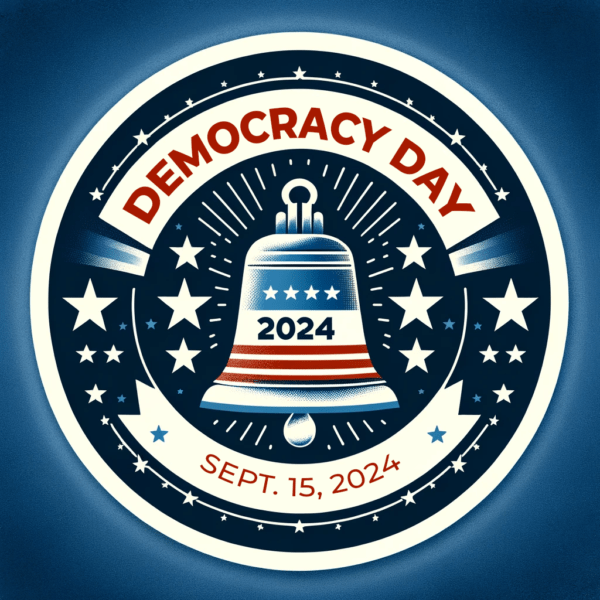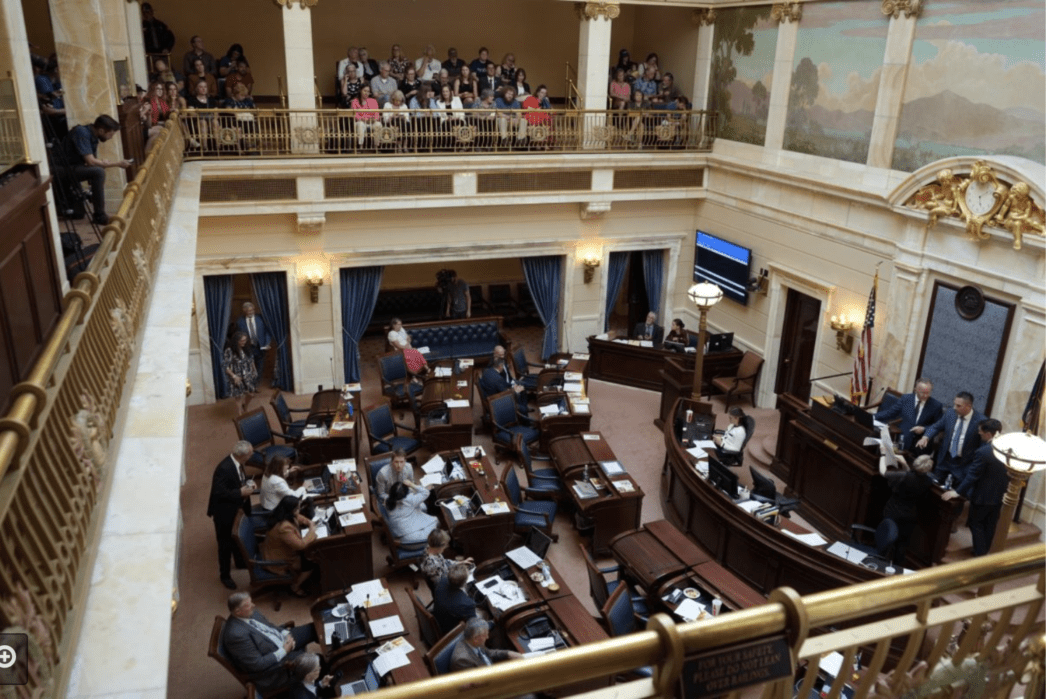Utah Legislature Puts Initiative Changes on November Ballot
This story is published as part of U.S. Democracy Day and the Utah College Media Collaborative, a cross-campus project bringing together emerging journalists from Salt Lake Community College, the University of Utah, Utah State University and Utah Tech University.
The Utah Legislature met in a special session Wednesday evening to consider adding a measure to this year’s ballot that would affirm lawmakers’ right to repeal and replace voter initiatives.
State senators and representatives debated the bill’s hastiness, balance of power implications and breadth during Wednesday’s session before ultimately passing the bill.
The measure will now appear on ballots for voters to decide in November.
Disputes Over Redistricting
The session comes on the heels of a unanimous Utah Supreme Court ruling last month validating the right to alter or reform government through ballot initiatives.
Ballot initiatives are petitions to propose new laws. For a statewide initiative to be proposed, petitioners must collect nearly 135,000 signatures from at least 26 of the 29 state senate districts in Utah.
July’s Utah Supreme Court decision sent a lawsuit between the League of Women Voters of Utah and the Utah State Legislature back down to a district court for ruling. The lawsuit alleged the Legislature unlawfully engaged in partisan gerrymandering when it redrew district lines in 2021.
The lawsuit also claimed the Legislature violated the people’s lawmaking power when it repealed Proposition 4 in 2020. Passed by voters in 2018, Proposition 4 created a nonpartisan commission responsible for recommending district lines to the Legislature.
The suit went to the Utah Supreme Court after the Legislature motioned to dismiss the case in October 2022. District court granted the state a dismissal of the lawsuit’s claim that ignoring Proposition 4 went against the Utah Constitution, but refused to dismiss the partisan gerrymandering claims. In November 2022, the state appealed the decision. After hearing arguments in July 2023, the Utah Supreme Court issued a ruling last month that the district court needed to reevaluate granting dismissal of the Proposition 4 claim.
“The people’s right to alter or reform the government through an initiative is constitutionally protected from government infringement, including legislative amendment, repeal, or replacement of the initiative in a manner that impairs the reform enacted by the people,” the Court’s opinion read.
S.J.R. 401
The Senate and House debated several bills pertaining to the Supreme Court’s ruling Wednesday night, and S.J.R. 401 had the most discussion.
S.J.R. 401 is a proposal to amend the Utah Constitution.
Perhaps the most controversial part of this bill is its provision to “provide the circumstances for amendment, enactment, or repeal of [a] law passed, adopted or rejected by the voters.” In essence, it will give the Utah Legislature a constitutional right to change or reject ballot initiatives that voters have adopted as the Legislature sees fit.
“We know that law is a living, breathing thing,” Sen. Kirk Cullimore (R), the bill’s Senate sponsor, said while introducing it to the floor for debate. “We see this every year in the general legislative session, and we regularly amend statute.”
Cullimore argued the Legislature’s ability to amend law is an essential function. However, the Supreme Court’s ruling on ballot initiatives, he said, created a new class of “super laws” that would render adopted ballot initiatives untouchable.
However, the Legislature can alter the implementation of ballot initiatives as long as alterations still reflect the initiative’s purpose. As the Utah Supreme Court’s opinion states, “This does not mean that the Legislature cannot amend a government-reform initiative at all. Rather, legislative changes that facilitate or support the reform, or at least do not impair the reform enacted by the people, would not implicate the people’s rights under the Alter or Reform Clause.”
Some Senate and House members expressed concern over S.J.R. 401.
“I am opposing this bill because we’ve been called into special session under false pretenses, in my estimation,” Sen. Kathleen Riebe (D) said, “and my constituents are concerned about that.”
For the Legislature to call for a special session, two-thirds of both houses must agree that there is a “persistent fiscal crisis, war, natural disaster, or emergency in the affairs of the State necessitates convening the Legislature into session.” Riebe argued that none of these provisions were present when the special session was voted on.
Meanwhile, other legislators emphasized the importance of being able to amend laws as times and opinions change.
“We don’t know how the strict scrutiny standard would be applied to these types of things,” Sen. Evan Vickers (R) said, “and so it puts those efforts, those corrective efforts, that have been done by legislation, into question, and would put that into question for every initiative going forward.”
Several legislatures pointed to a ballot initiative adopted in 2018 that legalized the use of medical marijuana as an example of this. As it’s speculated that the federal government will reclassify marijuana as a less dangerous drug, Utah legislators need the power to adjust legislation to align with federal policy. They argued that this would be significantly more difficult with the Supreme Court’s decision.
Legislators did emphasize that this proposition will not make it more difficult for Utah citizens to introduce ballot initiatives.
“We’re not making initiatives harder to do,” Senate President Stuart Adams (R) said. “We’re actually keeping them the same.”
 Josi Hinds reported and wrote this story as a journalism student with the University of Utah’s The Daily Utah Chronicle. Her article is part of U.S. Democracy Day, a nationwide collaborative on Sept. 15, the International Day of Democracy, in which news organizations cover how democracy works and the threats it faces. To learn more, visit usdemocracyday.org.
Josi Hinds reported and wrote this story as a journalism student with the University of Utah’s The Daily Utah Chronicle. Her article is part of U.S. Democracy Day, a nationwide collaborative on Sept. 15, the International Day of Democracy, in which news organizations cover how democracy works and the threats it faces. To learn more, visit usdemocracyday.org.

